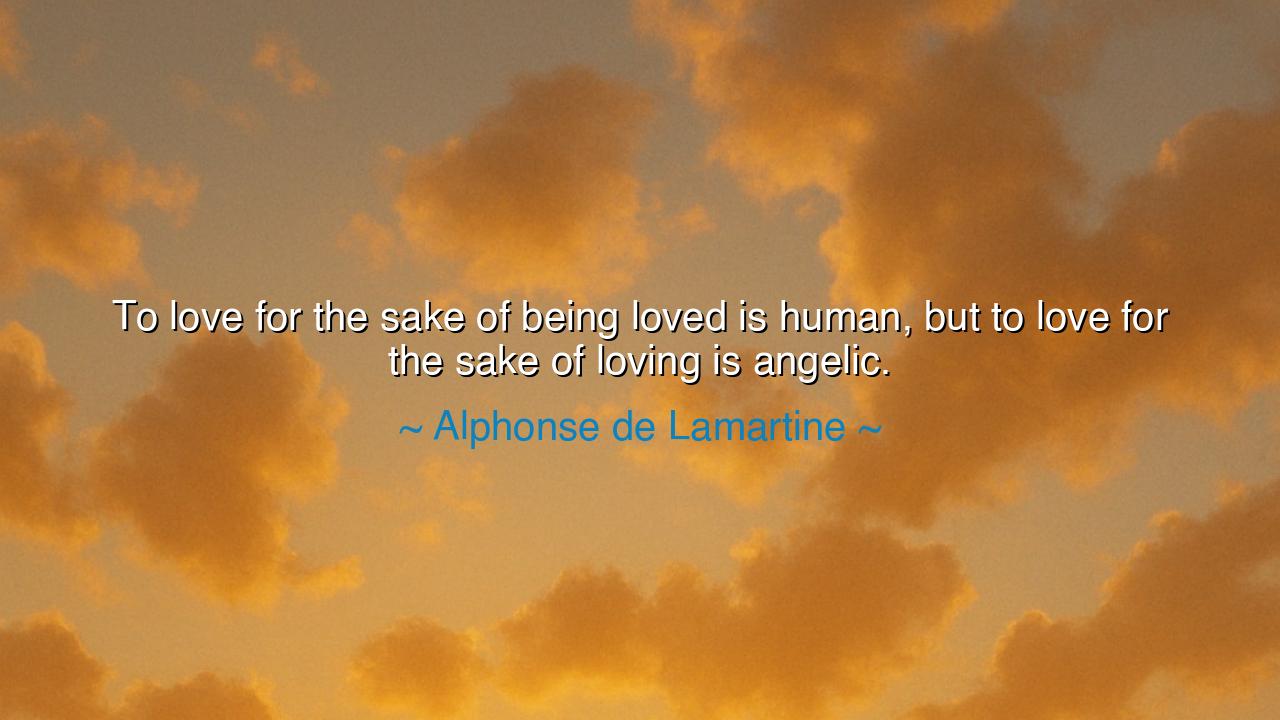
To love for the sake of being loved is human, but to love for the
To love for the sake of being loved is human, but to love for the sake of loving is angelic.






“To love for the sake of being loved is human, but to love for the sake of loving is angelic.” — Alphonse de Lamartine
In this radiant reflection, Alphonse de Lamartine, the poet and philosopher of the Romantic age, unveils the great ladder of love — that ascent from the mortal to the divine. The first step, he says, is human love, born from need and longing: we love so that we might be loved in return. Yet higher still is the second step — angelic love, pure and selfless, which loves not for gain, not for recognition, but simply because love is its own purpose, its own joy. In this, Lamartine gives us a vision of love not as transaction, but as transformation — not as desire fulfilled, but as the soul’s highest act of giving.
Lamartine lived in a century of passion and upheaval, where men sought meaning in both reason and feeling. He, however, turned to love as the highest law of existence. He saw that most hearts love in hunger, not in wholeness; they seek affection as a mirror, not as a flame. To love for the sake of being loved is to seek comfort — it is tender, natural, and deeply human. Yet it is still bound by the self, still limited by the need for return. But to love for the sake of loving — to love even when unreturned, to bless even when forgotten — is to rise above the human condition. Such love does not depend upon another’s gaze; it burns with its own light.
The ancients spoke of this truth long before Lamartine gave it voice. In the sacred texts of many peoples, divine love is portrayed as the love that gives endlessly — like the sun that shines on both the just and the unjust, asking nothing in return. Christ on the cross, forgiving even those who crucified Him, embodied this angelic love. It is the love of compassion that flows outward without condition, born not of desire but of divinity. It is what the saints, the sages, and the mothers of the world have always known — that love’s greatest beauty lies not in receiving, but in giving beyond measure.
Consider, for example, the life of Mother Teresa, who walked among the poorest and most forgotten souls of Calcutta. She did not love them because they could love her back — they had no riches, no fame, no comfort to offer. Yet she loved them with a fierce and radiant tenderness, because love itself compelled her. When asked how she could continue her work amidst such suffering, she answered simply, “I am not called to be successful, only to be faithful.” Her love was angelic — it existed for the sake of love itself, not for reward, not even for recognition. In her heart, Lamartine’s wisdom became living truth.
But let us not despise human love, for it is the beginning of the journey. To seek love is to admit our longing for connection, and in that longing lies the seed of the divine. The danger only comes when we stop there — when we measure love by what we receive, rather than by what we give. The soul matures when it learns that true joy lies in loving without demand, in offering itself without fear of loss. For in such love, we reflect the angels; we partake of eternity even while still walking upon the earth.
Lamartine’s vision, then, is both a challenge and a promise. He calls us to move from the love that feeds the heart to the love that frees it — from the love that asks, “Do you love me?” to the love that says, “I love you still.” Such love is not weakness, but strength. It is not sorrow, but serenity. For when we love purely, we no longer depend upon the world’s fairness or fate’s mercy. We live instead in the boundless realm of grace, where every act of love — even unseen — becomes an offering to the divine.
And so, O listener of wisdom, take this teaching as your guide: Love, but let your love evolve. Begin as human, but strive toward the angelic. Love those who love you, but also those who do not. Love the broken, the distant, the difficult. Give kindness even where none is returned. For in doing so, you shall touch immortality — for to love for the sake of loving is the soul’s highest art, the truest reflection of heaven in the heart of man.






AAdministratorAdministrator
Welcome, honored guests. Please leave a comment, we will respond soon